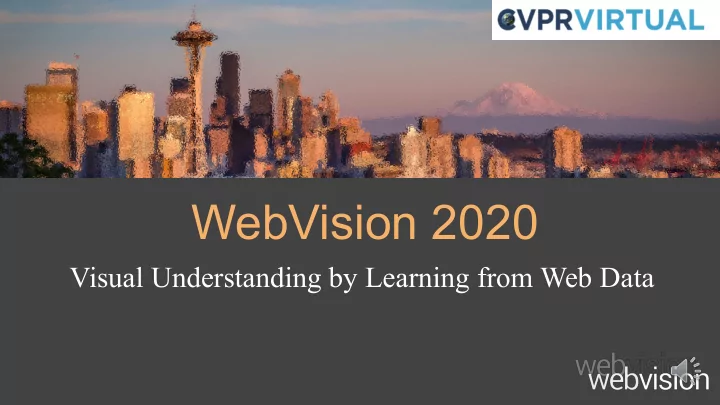

WebVision 2020 Visual Understanding by Learning from Web Data
Workshop Organizers General Chairs J. Berent L. Van Gool A. Gupta R. Sukthankar Program Chairs Wen Li Hilde Kuehne Suman Saha Qin Wang Limin Wang Wei Li
Thanks to Workshop Sponsors & Collaborators Dataset Collection & Challenge Hosting Sponsor for Challenge and Award Collaborator in Challenge Organization Collaborator in Challenge Organization
Program Schedule 9:00 Opening Remarks 10:15 Paper Session (ID 1-3) 9:10 Dataset/Challenge Overview 10:30 Live Q&A Session 9:30 Participant Presentation by Huawei 10:36 Paper Session (ID 4-6) 9:40 Participant Presentation by Tencent 10:51 Live Q&A Session 9:50 Participant Presentation by Pcitech 11:00 Award Session & Closing Remarks 10:00 Live Q&A Session
Deep Learning Revolution Revolutionizing almost all fields of computer vision LeNet AlexNet GoogLeNet ResNet DenseNet
Deep Learning Revolution Powered by human annotated big data LeNet Image Classification AlexNet Object Detection GoogLeNet Instance Segmentation ResNet Image Captioning DenseNet
Deep Learning Revolution -- Our Hope LeNet Image Classification AlexNet Object Big Data Detection GoogLeNet w/o human Instance Segmentation annotation ResNet Image Can we get equivalent performance using Captioning {self, weakly, un}supervised methods? DenseNet
Deep Learning Revolution -- Previous Years LeNet Image Classification AlexNet Object WebVision 2017 Detection GoogLeNet w/o human annotation Instance Segmentation ResNet Image Captioning Yes! DenseNet
Deep Learning Revolution -- Previous Years LeNet Image Classification AlexNet Object WebVision Detection GoogLeNet 2018/2019 Instance Segmentation w/o human annotation ResNet Image Captioning A Bigger Dataset DenseNet
Deep Learning Revolution -- This Years LeNet Image Classification AlexNet Object WebVision 2020 Detection GoogLeNet w/o human annotation Instance Segmentation ResNet Image Captioning The Same Big Dataset DenseNet
Supervision using noisy & weak web signals keyword based Google search Training Data Classifier Internet No human annotation is used
Learning from Web Data Advantages ➢ No human annotation is needed for images ➢ Coarse semantic annotation generated from search engine or social signals ➢ Large number of images and classes ➢ High diversity (multiple sources) Challenges ➢ Noisy Labels ➢ Use of meta-information ➢ Domain adaptation issue
Learning from Web Data Recent Advances 1. Z. Wei et al. Learning Visual Emotion Representations From Web Data. In CVPR 2020 2. Y. Tu et al. Learning From Web Data With Self-Organizing Memory Module. In CVPR 2020. 3. D. Mahajan et al. Exploring the Limits of Weakly Supervised Pretraining. In arxiv, 2018. 4. C. Sun et al. Revisiting Unreasonable Effectiveness of Data in Deep Learning Era. In ICCV 2017. 5. Y. Li et al. Learning from noisy labels with distillation. In ICCV 2017. 6. A. Veit et al. Learning From Noisy Large-Scale Datasets With Minimal Supervision. In CVPR 2017. 7. A. Joulin et al. Learning Visual Features from Large Weakly Supervised Data. In ECCV 2016. 8. S. Azadi et al. Auxiliary image regularization for deep cnns with noisy labels. In ICLR 2016. 9. X. Chen and A. Gupta. Webly supervised learning of convolutional networks. In ICCV 2015. 10. T. Xiao et al. Learning from Massive Noisy Labeled Data for Image Classification. In CVPR 2015. 11. S. Sukhbaatar et al. Training convolutional networks with noisy labels. In ICLR 2015. (and many more…) Lots of work but hard to compare methods & quantify progress in the field. Need for a common dataset and challenge.
Workshop Contributions WebVision 2.0 dataset WebVision Challenge - 5,000 categories - WebVision Image - 16M internet images Classification Track - 290K validation images - 290K test images
Our Vision for WebVision Understand deep learning from web data by enabling direct comparisons to ● methods that trained on ImageNet data. ● Facilitate research on handling the challenges of learning from web data, e.g., label noise, class imbalance, meta-information ● Unite the research community to solve those challenges
Program Schedule 9:00 Opening Remarks 10:15 Paper Session (ID 1-3) 9:10 Dataset/Challenge Overview 10:30 Live Q&A Session 9:30 Participant Presentation by Huawei 10:36 Paper Session (ID 4-6) 9:40 Participant Presentation by Tencent 10:51 Live Q&A Session 9:50 Participant Presentation by Pcitech 11:00 Award Session & Closing Remarks 10:00 Live Q&A Session
Recommend
More recommend